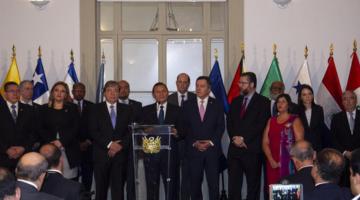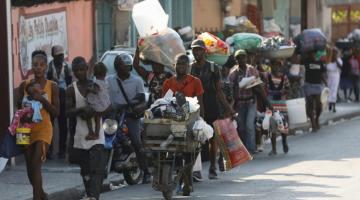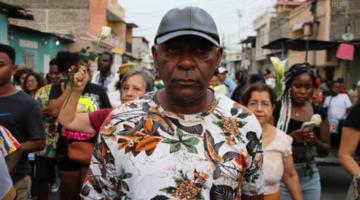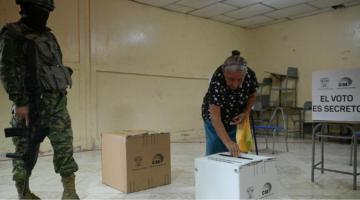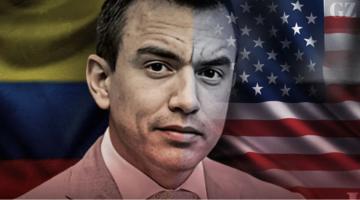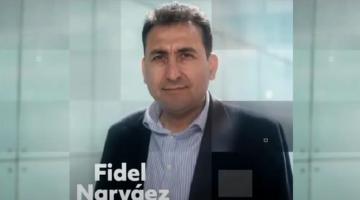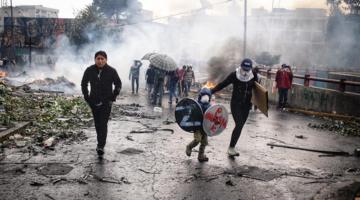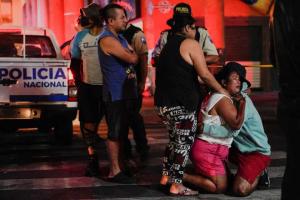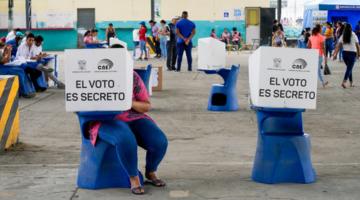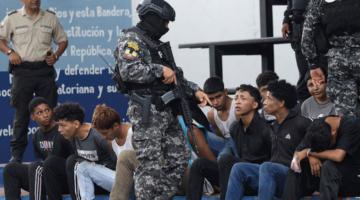Ecuadorian soldiers in Guayaquil on Feb. 5 John Moore/Getty Images
Ecuador was once a safe country. However, U.S. interference, the rise of neoliberal economic policies, the dollarization of its currency, and enhanced state repression have combined to worsen the lives of the people. In part two of this interview, Clau O'Brien Moscoso, Black Agenda Report Contributor, and Juan Fernando Terán discuss the attack on African, Indigenous, and poor communities disguised as a "war on crime."
On January 3rd, Black Agenda Report contributor Clau O’Brien Moscoso interviewed economic analyst Juan Fernando Terán on the deadly war on crime that President of Ecuador Daniel Noboa has imposed on the Ecuadorian people, with fatal consequences for African, indigenous and poor communities. One such case is that of the Guayaquil Four, four young African boys forcibly disappeared then murdered by members of the Ecuadorian Air Force on Dec 8, 2024. The following is the second part of the interview; the first can be found here.
Juan Fernando Terán: I believe that Ecuador has been an absolutely successful case of management by the CIA and the State Department because they have impressive control over things. And how have they achieved that control? Perhaps what could be pointed out is that the left has committed some errors and will continue to do so because I don’t see them reacting either.
One of those mistakes was never presenting the issue of public safety as a problem of collective importance. Since the issue of safety is not immediately addressed at the level of mayors, prefects, or any dignitaries who have been on the left, the issue of safety should have been positioned immediately. Since there is no clear, obvious, and forceful discourse regarding safety, the discourse of "kill the thief" takes over. First, kill the thief, harm the poor, and then we'll see if they were a good poor person or a bad poor person. And that’s exactly what happened in the case of these four boys in Guayaquil.
What is impressive is to observe how, through these influencers and social media devotees, the issue is framed. That’s why I tell you, NGOs no longer matter; they continue to portray them as criminals, with a discourse that the left fails to break. And what do I mean by failing to break? The discourse is like, "It’s the parents' fault, why didn’t the parents take care of their children? Why do they allow them to go out late at night?" As if it were a problem of the parents, of the poor, the insecurity. Yes, blaming the poor for what happens to them, in any way, that’s the discourse of the right. You’re poor because you want to be, because you allow it to happen to you. So there I see a terrible mistake.
I think we also need to think about a mistake being made with these gender and identity-based demands. Because that is also taking its toll in Ecuador. Before that, I want to clarify one thing. I am in favor of everything that goes against the right, and I say it openly. If the right says no to abortion, I say yes to abortion, at any stage, and stop bothering. If a person wants to identify as a man, woman, plant, or cat, let them do so it is their freedom.
But having said that, now let’s talk about something else. The easiest way to scare a population is to scare them through their children. And this discourse against gender identities has not been broken by the left. The left is blamed for wanting to turn children into transgenders, into gays, into lesbians. And for a poor population that doesn’t have access to education, that doesn’t even know what it’s about, it’s the easiest way to control them. So, while rights like the right to abortion have been won here, that’s also conditional and limited for now.
But there is already a cultural and ideological framework that will allow the right to easily start criminalizing that behavior and reversing acquired rights. Because as long as there are discourses in a country where even women say, "I’m a feminist, but not too much," what does that even mean? Not too much? These kinds of discourses, which have not been dismantled, are what fuel a poor and ignorant population—sorry, but it’s true. They fuel what’s happening.
Why do I emphasize this about a poor and ignorant population? Because during Rafael Correa’s government, a lot of importance and attention was given to education. Education was crucial because it’s not just about becoming an economic power; education creates citizens, it creates people with the capacity to understand things. But what kind of citizens can we expect when there is no longer education? When the public education system has been dismantled? These things are not free; they are well thought out. Destroying the education system to eliminate people who have the capacity to even read a pamphlet, to think critically—that’s what’s happening in Ecuador. And here, these issues of gender and environmental demands, if they are not handled well by the left, will only strengthen the right.
And to make this clear, let me give an example. Look, why don’t they just do a simple referendum? A referendum was held in which people said they didn’t want oil extracted from environmentally protected areas. That referendum was won because people do have an idea that the environment needs to be protected. But at the same time, while they have that idea of protecting the environment, they want to consume, they want to buy phones, they want to buy TVs, without realizing that all of that requires resources, resources obtained through the export of what? Raw materials like oil and mining.
So, the referendum should not have been formulated as "do you want to stop oil extraction in protected areas?" but rather, "are you willing to also give up high consumption to defend nature?" Because that’s what’s happening. They won that popular referendum, but they’re still using the oil they want. So, they simply didn’t recognize what the people wanted; they completely ignored it, saying it would start operating in a few years, not now, etc.
So, I see that the situation is going to get very serious, in a European or American style, with a population that is increasingly becoming more ignorant—and I say it openly. A population that reacts to social media in absurd ways and doesn’t look beyond that. Let me give you an example to make this very clear. You might think it’s a trivial example, but no, it’s not trivial.
When you’re on the bus, on the street, or in a school, you see how young people talk about how beautiful the First Lady is and how handsome the President is, and how they take photos because, through social media, they literally create the image of a royal couple, a majestic pair, where the shots, the photos are perfect, she’s perfect, he’s perfect, shot from the right angle.
There’s a whole series of things that influence people’s behavior because, seeing that, one says, "They are first-world, they are good people," even if that means denying oneself as a population. And that’s surprising when you talk to friends, relatives, or children, and the discussion is, "Yes, the government does stupid things, they commit a lot of abuses, but did you see how beautiful the First Lady looked?" That kind of thing is happening, and with that population, it’s complicated.
I think, speaking in more structural terms—and this might sound very politically incorrect—Ecuador needs to rethink mandatory voting. Voting should not be mandatory in Ecuador. If someone doesn’t know who to vote for, they shouldn’t vote, but they shouldn’t drag the rest of us down with them.
Second point, I think seriously, Ecuador and humanity will have to rethink youth voting because here, 16-year-olds can vote, and under the current conditions of ideological domination, that doesn’t guarantee freedom.
Let me explain. I think it’s well justified, politically, humanly, and in every sense, to give the vote to a young person who fought in the Sandinista war against Somoza at 16. A young person who was there is not a kid; the population that fought against Somoza was more adult than any of us, and they deserved, as indeed happened in Nicaragua, the right to vote at what we now call adolescence, because they weren’t adolescents; they were people who had risked their lives seriously.
But now, with young people who don’t risk their lives even by going to the corner because they prefer to be on their phones, I think we need to seriously consider such a big responsibility. Because what we’ve seen in the last three elections is the weight of the youth vote. They voted for the previous president, the banker Guillermo Lasso, whose campaign was about wearing red shoes and dancing in a youthful jacket—something no politician does—and they voted for him because, as the girls said, "He’s handsome." There’s a manipulation of social imaginaries that is happening, and it forces us to seriously think about what democracy means.
Well, speaking of that, I think part of what you’re talking about with education is part of the strategy to reduce the state in order to privatize all resources. So, I think that’s also part of it—reducing education to avoid having citizens who think critically. But I definitely think this is visible in other countries too.
Claudia O’Brien Moscoso: Another thing I wanted to ask you about was BRICS, specifically China, and here in Peru the Port of Chancay, which is now connecting Asia to Latin America directly without going through the United States. And the Southern Command has said it very clearly: China’s expansion in this region is something they have to stop. So, how do you see Ecuador’s role in this war that SOUTHCOM wants with China, which is already preparing for battle?
JFT: Look, I’m going to respond to this by drawing on some historical memory, and that will help you understand what has really happened in the country. During the Cold War, roughly in the 70s and 80s, Ecuador’s flower and banana entrepreneurs opened markets with Russia in the middle of the Cold War. Why? Because they were flower and banana entrepreneurs, so they needed to export flowers and bananas.
When Rafael Correa was in power, the entrepreneurs thought about exporting to Europe, and there was talk of expanding ties with China. Why? Because they were entrepreneurs exporting shrimp, bananas, and flowers to Europe or China. But in a context where your business, your line of work, is no longer about exporting bananas, shrimp, or flowers, do you care about opening markets to China or not? That’s not the real goal anymore.
Exporting bananas is no longer the business; the business now is using banana boxes to send drugs, and that’s what needs to be understood. So, in this geopolitical context, who will Ecuador strengthen relations with? With Italy, with Albania, and with the countries that generate the flow of drugs into Europe. That’s what interests them.
So, you can’t say Ecuador has a genuine interest in being part of BRICS. It doesn’t, because the entrepreneurs aren’t interested in that; that’s not where their business is going anymore. The difference between what happened in the 80s and the early 2000s is that they’re no longer exporting legal goods, and that’s what needs to be understood.
So, for Ecuador, BRICS might do something—there’s already a free trade agreement with China—but that’s not where their interest lies. It’s not really of significant importance to Ecuador because, look, one might think—and I repeat, under a government of banana republics—that they should be thinking about exporting bananas to China, given the huge population there that could consume at least one banana. But that’s not their concern; that’s not where the business is.
What about the military base in the Galápagos and what’s happening with the port in Lima, the Chinese port? I think they do want a base in the Galápagos, as they had during World War II when the U.S. had a base in Baltra. They want a military base there again for the conflict that’s coming by 2040 to 2050 at the latest—hopefully only by 2040 and not sooner.
Why 2040? Because remember, the issue of Taiwan is absolutely symbolic for China. They have stated repeatedly that by the 100th anniversary of the Communist Party’s victory in 1949, which would be 2049, Taiwan must return to being fully part of China, just like Hong Kong.
So, they’re setting the stage for that confrontation, leveraging the symbolic importance it holds for China. Imagine what it would mean for China if, after decades of repeating that date, nothing happens when the time comes. What would China be? It’s a huge symbolic blow in a country where symbolism is important as a form of political control, because it is—national unity, nation-building.
So, I think they are trying to set that up in the long term, but in the short term, the goal of that base in the Galápagos is different. First, it’s about ensuring control over an Ecuadorian government. Knowing that if you give me this, I’ll keep you in power. That base has very important characteristics, not so much for a potential war with China in the coming decades, but because it’s strategically located—distant from Central America, South America, Lima, and also in terms of air routes to Venezuela. I think they’re interested in it to control the regional problem that is Venezuela for the United States. And obviously, Panama now with Trump, because the Galápagos is equidistant, which is why there’s a special zone that extends to Costa Rica and all of Central America. That’s where I think it’s headed. In terms of blocking Chinese ships from reaching Lima, I don’t think so; they won’t get into that kind of conflict because it would be pointless at this moment when there are other, more interesting things to do from the U.S. perspective. But yes, there is a component of that.
CO: And regarding the internal right-wing in Ecuador, how do you see them working not only with the government but also against the population? Not just the military and police, but also non-state right-wing groups.
JFT: Well, in Ecuador, there has traditionally been a division between the right-wing of the Sierra and the right-wing of the coast. The coastal right-wing has been linked to exports since the 19th century, even the 18th century, and has always had a more entrepreneurial, aggressive, capitalist character, so to speak. The Sierra right-wing has always focused on the domestic market, industrial production, and meeting the needs of the local population, not exporting abroad.
So, there has always been that division. This division has also been reflected in the banking sector, with a strong distinction between coastal and Sierra banks, even though now they’re all involved in this illicit business. That’s true, but it seems that due to the style of government of this current leader, a rift has emerged between the elites of the Sierra and the elites of the coast. It’s not an insurmountable difference, not enough to say, “let’s support the left or a social-democratic position,” but it is a difference that makes them uncomfortable.
Why? Because the current ruler wants to keep everything for himself and do business only for himself; he’s not sharing the plunder of the state with other business groups. And I repeat, he’s not sharing the plunder of the state. It’s all between him, his friends, and his family. In the style of the 19th-century banana republics that the U.S. controlled with the dictators it installed in Central America and the Caribbean.
In the style of the 19th-century backyard and banana republic, this man only eats for himself; he doesn’t keep up appearances. And this is evident. Who’s behind the mining concessions? His people, his family. Who’s behind the barges for electricity? His people, his family. Who’s behind the potential deal to privatize the Sacha field? His people, his family. He doesn’t share.
This has upset the Sierra groups, but these Sierra groups, compared to what he’s doing, don’t have power. Because, let’s see, what power do these Sierra groups have? Industry? No, because it’s struggling, and there’s less and less local production, especially with a free trade agreement with China and the European Union. So, you can’t say there’s an industrial bourgeoisie; that doesn’t exist anymore. There might be small entrepreneurs doing little industrial things, but they’ll barely survive the next few years. What power do they have? Financial power, yes, that’s still there, but they don’t have narco power. That’s what they lack. So, what we’re seeing here is a fight between a narco-bourgeoisie and a purely financial banking bourgeoisie.
Why would a narco want to associate with a banker or financier from the Sierra? It doesn’t make sense. If drugs don’t circulate here, they don’t go out. And in fact, the gangs and all that stuff you see on TV are on the Ecuadorian coast, which doesn’t mean there aren’t gangs and drug problems in the Sierra, but it’s not on the same scale as what’s happening on the coast.
So, what we’re facing here potentially leads to a long-term alliance between drug trafficking that starts in Colombia, passes through Ecuador’s coast, and goes to Albania. As has already been reported in newspapers like El Comercio, La Hora, and others that have pointed out where the connections are. So, I don’t think the Sierra bourgeoisie is capable of stopping this man. They haven’t been able to, and it worries them because they know that with a leftist or even a moderately social-democratic government, some order could be restored that doesn’t suit them. So, I don’t think there will be much conflict. In fact, what will happen is that if there’s a runoff in Ecuador, everything will align with the right, despite the things he’s done and will continue to do.
And I don’t see that same consolidation on the left, do you? No, no. And even if there were consolidation, it wouldn’t be enough to overcome the problem. Let’s see, more or less the idea is this: in the first round, Luisa González could win by a margin of about 10 points, assuming it’s a transparent election without fraud. If there’s fraud, the margin will be smaller. Let’s imagine the difference between Luisa González and Daniel Noboa is five points in the first round. Just imagine that. Those five points can’t be made up with the Indigenous vote, the environmentalists, or other forces. They can’t be made up because it’s not a problem of whether they’re organized or not.
It’s a problem of having a population convinced by the discourse the right has been implanting for all these years. So, the problem here isn’t electoral; the problem is that the left has to return to what it no longer wants to do, which is grassroots work. And it won’t be able to return to that work because now it would be too costly. It wasn’t like that before.
Let me explain: if you wanted to do grassroots work ten or twenty years ago, what problem could you face? The military. Maybe they’d come and bother you while you were doing grassroots work in a community deep in the mountains of the coast or the Sierra. Now, that’s not the problem; now, doing grassroots work means directly confronting drug trafficking, which is allied with the exporting right.
So, I ask, are there those militants now? No. And that’s why you don’t see strong environmentalist mobilizations anymore. When Rafael Correa was president, Acción Ecológica and other environmental organizations in the country carried out big, visible public actions in defense of ecosystems like mangroves, forests, etc. They were present in the public sphere. What could happen to them? The government could repress them? And if they were repressed, it would make the news.
Now you don’t see those radical environmentalist groups doing public actions. They’re not there. When was the last radical public action by environmentalists? That’s a symptom that the left can’t return to mass work because it’s aged, because it no longer has the will, because it’s afraid, because it no longer has militants, or whatever, but the fact is that it’s no longer recovering that. So, what we’re facing now is that, at the local level, the doors have been left wide open for drug trafficking. I think we’re in a situation very similar to Mexico’s.
In the following sense: once drug trafficking enters, it doesn’t leave. At the local level, it’s the easiest thing for drug traffickers to put up candidates, councilors, mayors, governors, whatever. Even if they don’t control the state from the top—which they do—they also control it from below. They put in the mayors they want. And who controls that? How many mayors have died in recent years? Precisely mayors who had leftist leanings and didn’t want to allow drug trafficking to take over.
Because the problem we have to understand is that this is a transit country, where you have to control the clandestine airstrip on the beach. The businesses I do clandestinely in such and such a place—that’s what drug trafficking is about. How is money laundered in a country like this? Obviously through banks, but also through construction. So, low-level drug traffickers invest in construction, and for that, you need reliable municipalities.
The Ecuadorian state is already permeated by that logic. And there’s no way out of that. There’s no way the next government, whoever it is, can eliminate it, because it’s not in their interest either. Let me explain this point so it’s clear.
Suppose Luisa González wins the presidency. Launching a direct fight against drug trafficking means launching a fight against the military and the police. So, no, she can’t launch a direct fight against drug trafficking, even if she wanted to, because, I repeat, the Ecuadorian state is already narcotized. And if Luisa González doesn’t win, things will continue as they are, or even better for drug trafficking in the next government. So, this is no longer solvable. This is equivalent to Colombia in the 80s, where local drug traffickers put in mayors, deputies, governors, whatever. That’s Ecuador’s situation now. And that hadn’t happened before.
CO: And what do you see in other parts of the region where Ecuador helps push the US’s position? For example, the U.S. used Ecuador to push and is still pushing the Multinational Security Support (MSS) mission in Haiti because of the so-called “gang problem”, right? But as you were talking about the ports in Ecuador, which are private, to export these drugs, so too does the US use the private ports in Haiti to flood the country with arms. Both have an apparent crime problem but it is Ecuador saying Haiti needs another invasion. So, what can you say about that hypocrisy? That Ecuador is part of pushing the MSS mission in Haiti when they themselves have been, well, as you’re saying, a narco-state.
JFT: For the U.S., someone once asked me, what geopolitical value could Ecuador have? There are no big lithium mines here like in Bolivia, Chile, or Argentina, no huge oil reserves like in Venezuela. What could its geopolitical value be? This isn’t Panama, where global trade passes through.
Ecuador’s political value has to do with its subservience. That’s what the U.S. wants, because there’s an international system where a small country, the more servile its government, the more secure that vote is (in the UN). Ecuador has voted in favor of everything the U.S. wanted it to vote for. There’s been no independence in that, breaking with a tradition of Ecuadorian foreign policy that lasted decades. Until yesterday, Ecuador was part of the UN Security Council.
That’s the explanation: having a lackey in key positions is important because it serves U.S. interests at certain moments. Remember when they wanted to export weapons to Ukraine, and who said, “I’ll export them, hand over fist, happy and eager”? Ecuador. Then they couldn’t do it, but it didn’t matter. First, because they didn’t have weapons to export to Ukraine; they had few helicopters to send.
Second, that wasn’t the point. The point was symbolic: to make it appear to the world that the U.S. has support, that it has allies, to generate fake news so that some country that does have weapons would send them, like Bolsonaro did in Brazil. So, having a lackey that operates in international politics, voting against Nicaragua, against Venezuela, against Cuba, or abstaining, is important for the U.S. In other words, they don’t come to control us because we have things, but because we’re servile. That’s what’s happening.
Clau O'Brien Moscoso is an organizer and co-coordinator of the Black Alliance for Peace Haiti/Americas Team. Originally from Barrios Altos, Lima, she grew up in Kearny, New Jersey. She attended college, lived, and organized in New York City for 15 years, and is now based in Lima, Perú, writing about Latin America and the Caribbean for the Black Agenda Report.

